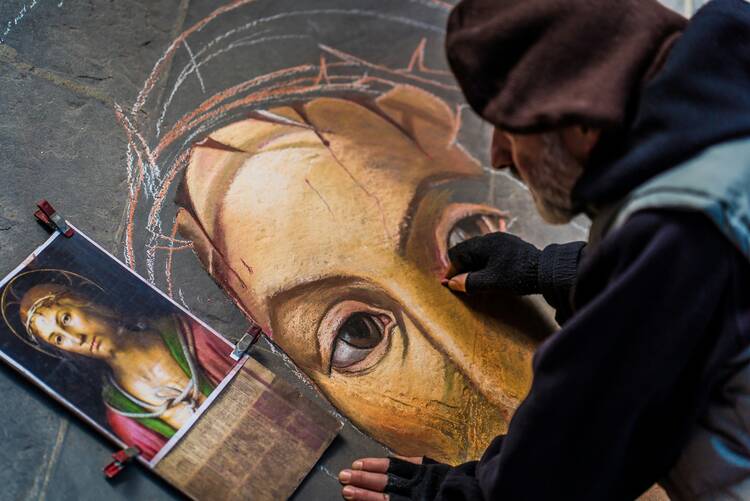A Reflection for Saturday of the Fourth Week of Lent
Find today’s readings here.
In today’s Gospel reading, John the Evangelist emphasizes the difference between knowing Christ and knowing about Christ. Even though they “[did] not know the law,” as the Pharisees point out, the crowds and the guardshad personal experiences with Jesus that left them with a growing belief that he was the long-awaited Messiah. So did Nicodemus, a Pharisee himself. Israel’s religious leaders, by contrast, knew all about who the Christ was expected to be, but were unable to believe that Jesus of Nazareth was the fulfillment of that hope.
Today’s Gospel reading is part of a longer account of a visit Jesus made to Jerusalem for the feast of Tabernacles, which is also known as Sukkot. The festival of Sukkot remains one of the biggest Jewish holidays today. It is celebrated in mid- to late autumn with eight days of feasting in specially-built outdoor pavilions. Historically, Sukkot was a festival of the grain harvest; the outdoor pavilions commemorate the huts for agricultural laborers used for their rest periods. Spiritually, it was a time to remember the Exodus from Egypt, when all of Israel lived in mobile dwellings on their journey through the desert. In Jesus’ day, Sukkot may also have been associated with the coming Messiah. Popular belief held that during the feast a new Moses or a new David would arise and lead Israel to renewed freedom and national security.
This belief explains the opening lines of today’s Gospel passage: “Some in the crowd who heard these words of Jesus said, ‘This is truly the prophet.’ Others said, ‘This is the Christ.’” Jesus had been preaching in Jerusalem throughout the feast, and many—including the guards sent to arrest him—were inspired and excited by his words. Likewise, the Pharisee Nicodemus, who had shared a long night time conversation with Jesus early in his ministry (Jn 3:1-21), advocated for him among his peers. These people who encountered Jesus were inclined to put their faith in him.
By contrast, others used their knowledge of the expected Christ to talk themselves out of belief in Jesus. The leaders in today’s Gospel reading were highly educated individuals. Most of them probably spoke Greek and Aramaic and could read and write Hebrew. They were experts in Israel’s religious and legal history, and many were educated in Greek literature and philosophy as well. People trusted them to interpret Israel’s cultural and religious traditions and hold the nation together, and it is a testament to their abilities that Judaism survived long periods of persecution throughout history.
Something about Jesus eluded their authority, however. Many people who encountered him believed in him regardless of the protests of Israel’s religious leaders. Many of those same leaders had certainly studied messianic prophecies, and they knew that Jesus did not seem to fulfill their expectations. Some argued that Jesus was too ignorant of Scripture to be the expected prophet (Jn 7:15). Others argued that, as a Galilean, he could not be of David’s line. Others had probably seen false messiahs come and go and had little interest in yet another wonder-worker with delusions of grandeur (see Acts 5:36-37). From the end of chapter 7 onward, John’s Gospel recounts the increasingly frantic reactions of Israel’s leaders to this individual in whom they could not believe but whose presence inspired so many.
In their dilemma lies a warning for Christians today. It is too easy to know about Christ without knowing Christ. It is too easy to worship the Church instead of the God it exists to serve. As we continue our journey through Lent, it is important to keep our hearts open to encounters with the living Christ—through Scripture, through the sacraments and through the poor. We must likewise be ready, when necessary, to leave behind the false expectations we may have built up about Christ. As Jesus once told Nicodemus, “The wind blows where it wills, and you can hear the sound it makes, but you do not know from where it comes or where it goes; so it is with everyone who is born of the Spirit” (Jn 3:8). Likewise, those who follow Christ must seek out encounters with the risen one, wherever he may be.








